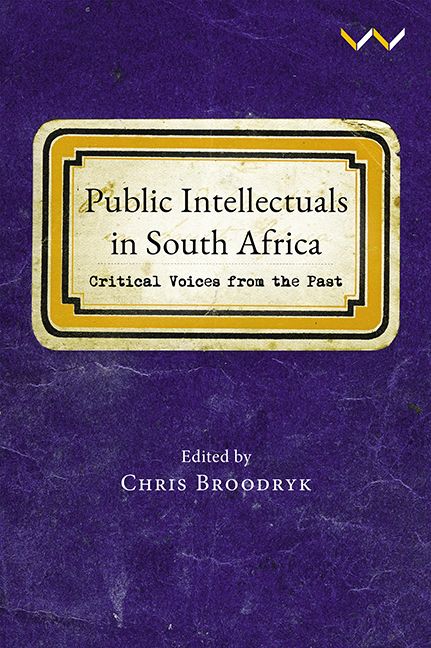Book contents
- Frontmatter
- Contents
- Acknowledgements
- Introduction: The Prismatic Nature of Public Intellectualism
- Chapter 1 Recalibrating the Deep History of Intellectual Thought in the KwaZulu-Natal Region
- Chapter 2 Elijah Makiwane and Early Black South African Public Intellectualism
- Chapter 3 Black Art Criticism in The Bantu World during the 1930s
- Chapter 4 In Conversation with the Nation: Sowetan’s Maverick Editor Aggrey Klaaste
- Chapter 5 William Pretorius and the Public Intellectualism of the Film Critic
- Chapter 6 Cultural Policy and the Arts: Mewa Ramgobin and Public Dialogue
- Chapter 7 ‘Kaalgat Critique’: The Public Intellectualism of Koos Roets as Afrikaans Satirist
- Chapter 8 The Public Intellectualism of Artivist Mandisi Sindo
- Chapter 9 The Janus-Faced Public Intellectual: Dr Thomas Duncan Greenlees at the Institute for Imbecile Children, 1895–1907
- Index
Introduction: The Prismatic Nature of Public Intellectualism
Published online by Cambridge University Press: 16 July 2022
- Frontmatter
- Contents
- Acknowledgements
- Introduction: The Prismatic Nature of Public Intellectualism
- Chapter 1 Recalibrating the Deep History of Intellectual Thought in the KwaZulu-Natal Region
- Chapter 2 Elijah Makiwane and Early Black South African Public Intellectualism
- Chapter 3 Black Art Criticism in The Bantu World during the 1930s
- Chapter 4 In Conversation with the Nation: Sowetan’s Maverick Editor Aggrey Klaaste
- Chapter 5 William Pretorius and the Public Intellectualism of the Film Critic
- Chapter 6 Cultural Policy and the Arts: Mewa Ramgobin and Public Dialogue
- Chapter 7 ‘Kaalgat Critique’: The Public Intellectualism of Koos Roets as Afrikaans Satirist
- Chapter 8 The Public Intellectualism of Artivist Mandisi Sindo
- Chapter 9 The Janus-Faced Public Intellectual: Dr Thomas Duncan Greenlees at the Institute for Imbecile Children, 1895–1907
- Index
Summary
Public Intellectuals in South Africa: Critical Voices from thePast is aimed at scholars and researchers whose academicinterests and activities link with the ideas and practices of publicintellectualism. The book is intended to engage with those whose work inacademia is politically committed, whose research on and in the variousaspects of the humanities in South Africa is dedicated to speaking truth topower, and who help to give voice and presence to those figures who havebeen (and possibly remain) marginalised and even silenced in South Africanhistory.
This volume ranges in scope from public intellectualism in journalism to theidea of the public intellectual in mental health, to the ways in which thepractice of art and the critical response to it are in themselves acts ofpublic intellectualism. The aim of the volume is to provide incisive andinsightful discussion and analysis of instances and practices of publicintellectualism.
The ideas and arguments in this volume provide original research on keymovements and figures in different histories of public intellectualism inSouth Africa. Each chapter offers a particular inflection on anddemonstration of the public intellectual and their activities in SouthAfrica as located in acts of journalism, storytelling, the arts and thelarger context of the humanities. Taking the different historical contextsinto account, the historical figures discussed in each chapter can beconsidered politically progressive.
For the most part, this volume follows the historical approach of McebisiNdletyana's African Intellectuals in 19th and Early 20thCentury South Africa, which highlights how ‘materialcollected from oral tradition or orature tends be to complex’.Equally complex, of course, was how African intellectuals straddled Africanand Western worlds. In Ndletyana's account, ‘early Africanintellectuals were a product of the missionary enterprise and the Britishcivilising mission’. One of Ndletyana's contributions to hisedited volume focuses on Tiyo Soga (1829–1871), whose ideas wereinfluential in both Black Consciousness and black theology. Soga is alsoreferenced in Chapter Two of this volume by Luvuyo Mthimkhulu Dondolo.
Njabulo S. Ndebele wrote in the foreword to Megan Jones and JacobDlamini’s Categories of Persons: Rethinking Ourselves andOthers: ‘The space of expanding and interactingidentities might just be the space for a future politics, one founded on andcomfortable with the creative uncertainties of the interaction of multipleidentities.
- Type
- Chapter
- Information
- Public Intellectuals in South AfricaCritical Voices from the Past, pp. 1 - 20Publisher: Wits University PressPrint publication year: 2021



